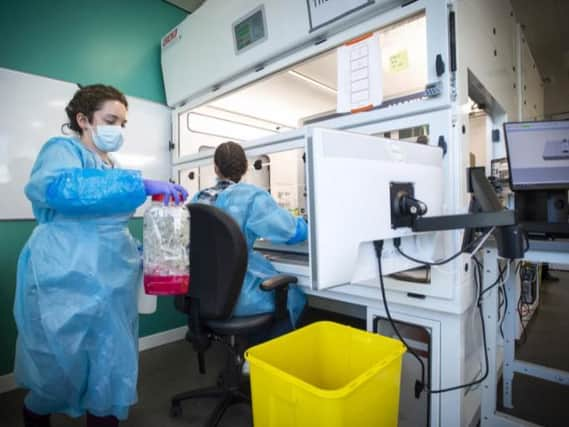Surge testing rolled out in Calderdale after outbreak of Covid-19 Delta variant


Everyone over the age of 12 who lives or works in Todmorden, Park and Warley is now being urged to take a PCR test, even if they are not showing symptoms of the virus.
Calderdale Council announced on Friday a small number of cases of the Delta variant (B.1.617.2), which was first detected in India, had been found in Todmorden and they were “linked to socialising in the evening”.
Advertisement
Hide AdAdvertisement
Hide AdThe Government has stepped in to help the council conduct door-to-door testing, enhanced contact tracing and genomic sequencing of all positive tests. It states that every who has tested positive for the variant has been told to self-isolate and their close contacts have been identified.
Health secretary Matt Hancock said the variant, which is now the dominant strain in the UK, had “made the race between the virus and this vaccination effort tighter” and "there is no room for complacency".
But Mr Hancock, who is due to announce whether the lockdown roadmap will be delayed on June 14, also said the vaccine is “breaking the link between infections, hospitalisations and deaths” and while 12,383 people have tested positive for the variant in the UK, only three of them had been admitted to hospital despite being fully vaccinated.
Deborah Harkins, Calderdale Council’s Director of Public Health, said: “Through preventative additional testing and enhanced contact tracing, we are taking early action to try to contain the spread of Covid-19 across the whole of Calderdale and in the communities where we know the risk is highest.
Advertisement
Hide AdAdvertisement
Hide Ad“This enables us to find cases of new variants and support people to self-isolate to prevent further transmission. By acting now, we can all work together to stop things getting worse.”
Mobile testing centres will be in all three of the worst-affected areas of Calderdale this week and testing kits will be handed out to students at some schools, so they can take them home and encourage everyone in their household to get tested.
Surge testing began in two areas of neighbouring Kirklees on May 26, due to concerns about a high infection rate and the spread of the Delta variant, and Kirklees Council announced it would be expanded to Thornhill, Heckmondwike, Liversedge and Westborough and Dewsbury Moor.
Bradford Council’s public health team has also begun conducting enhanced door-to-door testing in the city centre and 10 other areas, after a number of cases of the variant were identified.
Advertisement
Hide AdAdvertisement
Hide AdRose Dunlop, a public health consultant at the council, said: "We've got an indication that we're seeing increased levels of transmission of the variant and are particularly concerned about this. We want to try and keep our case numbers low so we're doing some proactive testing.”
She also said almost 60 per cent of the people in Bradford who have tested positive for the variant are under the age of 30 and 39 per cent are under 18.
“We haven’t identified a particular vaccine hesitancy issue in those areas,” she said.
“They are predominantly areas where we have a large number of young people living and that obviously makes a difference when this variant seems to be circulating among younger people at this time.”
Advertisement
Hide AdAdvertisement
Hide AdCalderdale Clinical Commissioning Group announced it has vaccinated 124,943 people with at least one dose and given 85,393 people their second jab. Across Yorkshire and the North East, more than 9m doses have been administered.